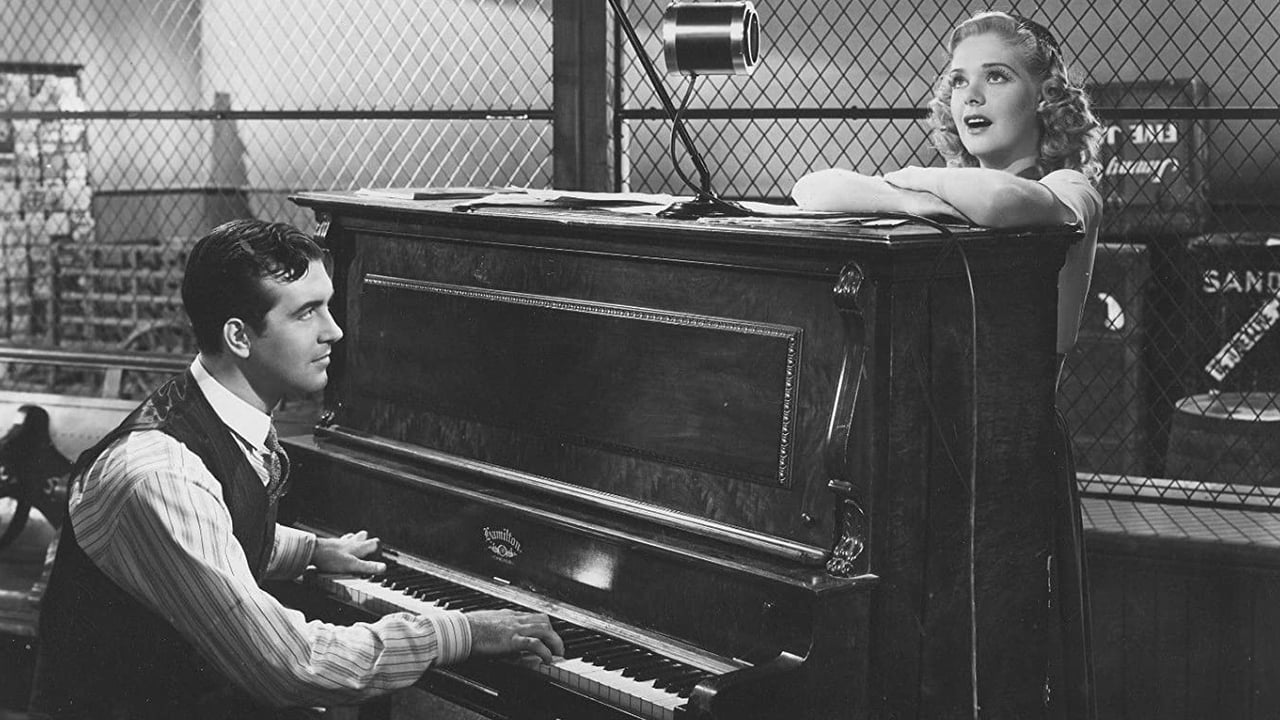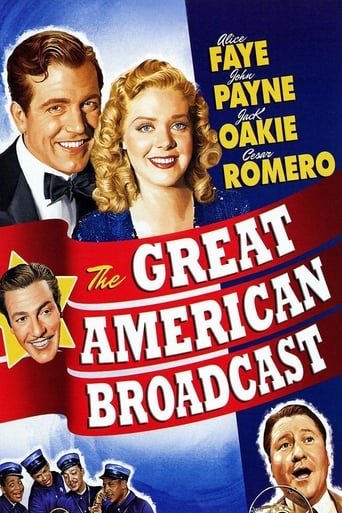Afouotos
Although it has its amusing moments, in eneral the plot does not convince.
WillSushyMedia
This movie was so-so. It had it's moments, but wasn't the greatest.
Grimossfer
Clever and entertaining enough to recommend even to members of the 1%
DipitySkillful
an ambitious but ultimately ineffective debut endeavor.
MartinHafer
many of the acts on the radio were VISUAL acts--the Ink Spots dancing, the violinists' antics, etc.The film begins with John Payne punching people and being rather nasty--and he continues like that throughout the film. It turns out he's a man of vision--but one who is perennially angry. He hits upon yet another scheme to make a fortune when he meets Jack Oakie--a guy who LOVES early radio. Payne gets the great idea of creating a radio station--one that is paid for by sponsors. It's rocky going at first but soon he's created a network of stations--and he ends up taking Oakie's girl (Alice Faye). However, the marriage is a mess--as Payne is, in many ways, a pain--and Faye has had enough. Can their love somehow prevail? Can they manage to survive despite a meanie's (Cesar Romero) desire to crush them? The bottom line is that this is yet another clichéd film involving a long-suffering woman in a troubled relationship with a butt-head. And you know that even when Faye is talking about divorce, they STILL will be together when the film ends. But, frankly, I saw no reason for her to stand by her man--he was annoying from start to finish.Now in addition to my talking about the plot, I must mention a HUGE problem with this film. While it is supposed to be a pseudo-history of the radio industry, the acts they have in the film often make no sense at all. In one case, a singing group then starts dancing (the Nicholas Brothers). It's impressive dancing, but how can the audience at home SEE this when they are listening to them on the radio?! In another, there are LOTS of comic antics by three violinists. BUT, their humor is all physical--so how can the audience at home possibly know what's happening?!? This sort of insanity occurs throughout the film. And, while these routines are very good, they just make no sense in a history of radio! It's sloppy and silly at the same time. Overall, while the song and dance numbers are nice, the plot and radio idea are poor and make for a weak film--one of the weaker ones in Faye's career.
marcslope
You know those Fox musicals: dreary plots, dragged-out playing times, benumbed direction, uninteresting photography, excruciatingly familiar casts, undistinguished or antiquated old-fave scores. This one, with less production values than usual, actually has a fun if unremarkable plot, pretending to be about the history of radio, but really just an excuse to let its stars do what they do best: Alice Faye to sing in her throaty, comforting contralto, John Payne to look handsome (he also warbles a bit, and not badly), Jack Oakie to clown (less annoyingly than usual). Mack Gordon and Harry Warren wrote many gorgeous ballads; here the keeper is "Long Ago Last Night," and it's a corker. It moves fast--positively at a gallop, by Fox standards--and though there are anachronisms everywhere, in the costumes and the dialog and the sets, this time you don't mind. A very entertaining, unpretentious Fox musical.
ilprofessore-1
Even back in the early 1940s when MGM was dazzling the world with their spectacular Technicolor musicals, Twentieth Century Fox under Daryl Zanuck's direction was still turning out modest B&W musicals like this one about the early days of radio. No breath-taking dance numbers but lots of pretty if ultimately forgettable songs by Mack Gordon and Harry Warren, enjoyable specialty numbers by the Ink Spots and the incomparable Nicholas Brothers (as railroad porters!); and even a parody radio commercial sung with German accents by those madcap expatriates from the Berlin cabarets, the Wiere Brothers (the poor man's Ritz Bros.) The fast-moving plot is expertly directed by the usually lethargic Archie Mayo with lots of gags and even a bit of pathos from Jack Oakie, and enough romance between handsome John Payne and adorable Alice Faye to keep the girls in the audience happy. Fans of big studio high-style glamor cinematography will enjoy the gorgeous close-ups of Alice Faye lit by J.P. Marley and Leon Shamroy. Mike Frankovitch, who was one day to become president of Columbia Pictures, can be seen briefly as a radio announcer.
Evan J. Chase
For those of us lucky enough to see Turner Classic Movies library of great MGM, Warners and RKO pictures, it comes as a letdown to see comparable 20th Century Fox pictures done with such juvenile plots--and there were many.The Great American Broadcast is worthwhile to see gorgeous Alice Faye (about the time she married Phil Harris), hear her great songs, see the incomparable Ink Spots, Weire Brothers and Nicholas Brothers! Also performing well in restrained character for a change is Jack Oakie.The backdrop of early radio is interesting, but the plot was so bad I had to turn away for a while--like broadcasting from a building rooftop from a tent in a thunderstorm(early AM low power radio would never reach far with all that lightning and static), also preposterous that John Payne would leave his beautiful new bride Alice Faye and run away to south america....only to have Jack Oakie beat him up to get him to look at her in the end....ha!!Thanks to the Fox Classic Movie Channel for providing a beautiful print, enjoy it just the same.

